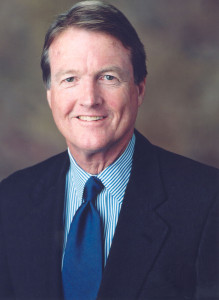UT: Cigarroa tired of ‘insubordinate’ Powers years ago

By Jon Cassidy | Watchdog.org
HOUSTON — Chancellor Francisco J. Cigarroa tried repeatedly between August and December last year to force out Bill Powers as president of the University of Texas, according to records obtained by Watchdog.org.
HIM OR ME: Chancellor Francisco Cigarroa tried for months to get Bill Powers, pictured, to step down as president of the University of Texas.
The problems weren’t new. On Feb. 3, 2010, Cigarroa had told the board privately the relationship with Powers was “unsustainable.” Powers was “abusive” and “dismissive,” in Regent Gene Powell’s words, and Cigarroa said “every year it has gotten worse.”
By August 2013, Cigarroa had called together a meeting of his vice chancellors, and they agreed that Powers’ relationship with his superiors had gotten even worse — it was “essentially insubordinate.” Cigarroa was convinced that Powers’ attitude wouldn’t improve, and that it was “expanding to others in his leadership team,” according to the records.
His conclusion: “Change in leadership in best interests of university,” according to notes of the meeting taken by Regent Alex Cranberg. “Firing would have adverse of (sic) affect on UT, best path forward is for BP to announce retirement.”
Yet the regents — in particular, swing vote Paul Foster — were reluctant to take action while a crew of lawmakers were busy going after Regent Wallace Hall for his vigorous oversight of Powers.
“We all know the spirit of what they’re trying to do — they’re trying to intimidate us,” Foster said, according to the notes. “But technically, a firing would not be disallowed.”
Foster was right that the Board of Regents had full authority to fire Powers, but three of them had made some form of promise to lawmakers not to do so without Cigarroa’s recommendation.
Cigarroa, for all of his attempts to engineer Powers’ resignation, didn’t want the call on his shoulders.
If Cigarroa had formally recommended that Powers be replaced, the vote would have been 7-2 in support, Foster said during one executive session, according to one of the participants who asked not to be named because he was not authorized to speak on the topic.
But Foster and Regents Ernest Aliseda and Jeffrey Hildebrand had committed not to fire Powers without that recommendation.
From August to December, Cigarroa tried multiple approaches to getting Powers out. At the August Regents meeting, Cigarroa offered to resign if it were necessary to boot Powers.
At a dinner in late August, Cigarroa told Powers he ought to resign some time after January, but Powers was “surprised, became defensive,” according to the notes. Foster, who was at the dinner, told Powers it wasn’t in the best interests of the university for them to fire him, but Powers called their bluff, saying “I don’t mind being fired,” according to the notes.
After that, Cigarroa was more emphatic at the next board meeting, insisting that Powers had to “provide exit plan by November” or he would “pursue range of actions from abrupt termination or dismissal by a certain future date.”
“I’m telling everyone this relationship is not recoverable,” Cigarroa said, according to the notes. “Bill does not lie to me. Trust is more than that. Bill’s major fault is that he’s not telling the truth. If you find the right questions to ask, he’ll let you get the answer, but you have to work for it.”
At the December meeting, Cigarroa again proposed a delayed retirement for Powers, even putting a “recommendation” about Powers’ employment on the agenda, so the board would be able to fire him if the votes were there.
The votes, of course, were not there, and neither was Cigarroa’s formal recommendation. Powers kept his job, with a public scolding, and Cigarroa decided to resign the next month, in order to return to practicing medicine full time.
The queasiness everyone felt about exposing themselves to abuse from lawmakers is summed up in the way Cigarroa answered a direct question from Cranberg.
“Would you recommend termination if BP doesn’t resign or would you require us to make tough call?” Cranberg asked.
“The right solution is win win one,” Cigarroa responded. “Otherwise Bill is putting himself before the university.”
Now, the Board of Regents faces the challenge of recruiting a new chancellor who will know beforehand how thoroughly legislators have undermined the position’s authority.
The Austin American-Statesman reported on a copy of the meeting notes it obtained last week, but left out most of the details.
There’s a growing body of evidence that lawmakers have been using their clout to get special treatment for favored candidates in the UT admissions process. A report on admissions favoritism is expect later this week.
Lawmakers, meanwhile, are trying to blunt the impact of that report by leaking a draft copy of their own report to a few reporters Monday.
According to details reported by the Houston Chronicle, the report is largely a rehash of flimsy and legally “absurd” charges from last winter’s show trial, when lawmakers paraded a series of Hall’s accusers before them, without giving Hall the chance to cross examine any of them, or even giving him a fair chance to tell his side of the story.
Prosecuting attorney Rusty Hardin used one simple trick throughout the hearings, and it’s repeated in his report: turn any exercise of authority or accountability into some variation of bullying, manipulation or coercion.
If Hall wants somebody fired for lying, don’t examine the truth of the claim – just call him a bully.
If Powers told lawmakers a long and fanciful story about Hall’s attempts to denigrate his fundraising successes, there’s no need to go back to the audit, which found that 76 percent of all non-monetary gifts that were examined by auditors had been improperly included in Powers’ fundraising totals.
Contact Jon Cassidy at jon@watchdog.org or @jpcassidy000. If you would like to send him documents or messages anonymously, download the Tor browser and go to our SecureDrop submission page: http://5bygo7e2rpnrh5vo.onion







